Fresh produce growers in some Asian countries have great product but often don’t have the knowhow to get it to markets; some just sell for low prices at local wet market markets and some are taken advantage of by big corporates and not given a fair price. One man who has made a big difference to a lot of growers in various Asian countries is Chris Catto Smith. He sees it as his vocation to help these growers earn a fair living while delivering a great product to the local and overseas markets.
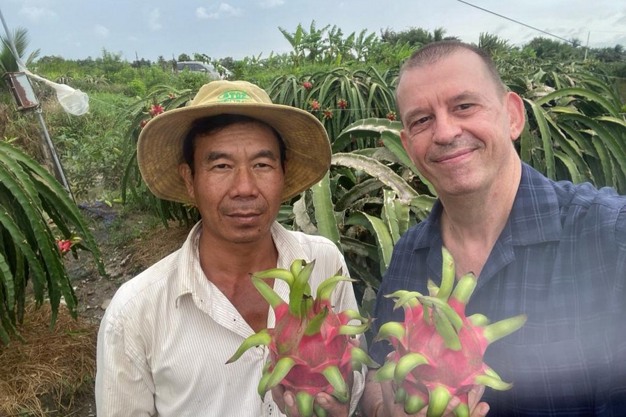
“I spent quite a lot of time in Vietnam with my colleague, Matilda Tran. She and I worked together to identify certified routes to market for fresh produce that was largely controlled by Chinese traders and Chinese collectors who were really financing and controlling the whole programme.
“We had an altruistic CEO at Metro and we were able to implement contract farming agreements and with the support of local agronomy consultants were able to get them certified with Viet GAP initially and then Metro’s own quality certifications, this came following a significant EU grant to promote Vietnam & Thai fresh fruit exports to Europe that I helped to write the proposal for and was part of the steering committee that managed the grant with the implementing agency, Chiang Mai University Post Harvest Institute. With a small dedicated cross functional team we were able to support the fast implementation of collecting centres and high-quality logistics at the sources of these agricultural growing areas.” It was a busy period that also involved the rapid implementation of a fresh fish processing platform in Cantho.
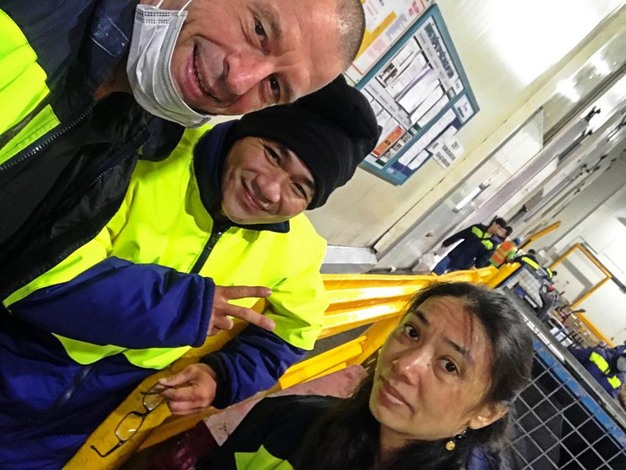
This process was for fresh produce: root vegetables, leafy vegetables, salad, salad vegetables, tomatoes and all of the Vietnamese salad vegetables. Chris worked with the implementation of team-work and leading Vietnamese agro-innovators such as Nguyen Van Dung to help farmers to control MRLs (get their use of chemicals down) and build confidence in a modern retail process, which was pioneered in Vietnam by Metro. Significant ground work had been achieved with Metro Fresh Project Manager Mathilde Thuy van Tran, working with farmers to improve their logistics practices and move to utilise proper crates at collecting, grading centres and washing facilities as close as possible to the farms, while at the same time removing convoys of small pickup vehicles coming down the highways with plastic bags full of produce which were getting damaged on their way to wholesale markets. With an extremely talented logistics manager Pham Viet Chung, we established proper cold chain treatment and contracted high quality cold chain trucks from Lam Dung (near Dalat) to Ho Chi Minh City allowing high quality cross docking at improvised perishable handling hubs, able to allocate fresh high quality produce directly to stores.
“Metro’s collecting centre was a first for Vietnam, which was later vacated and handed over to our competitor allowing us to move to a bigger facility, so that the farmers didn't have to deal with multiple processes. We also encouraged collaboration amongst the retailers in the standardisation of contracts with farmers.”
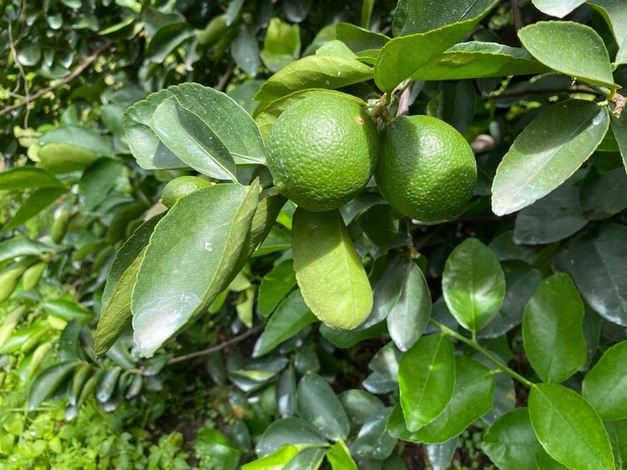
Initially the Metro Vietnam was purchasing around 60 tonnes a day which increased as the demand grew. This produce was bypassing the traditional wet markets where normally buyers purchased their produce overnight and was directed straight from the collecting centres to the retail cross dock facilities allowing farmers to be paid at the local delivery platforms. The traditional approach was that farmers or collectors had to transport produce, try and sell in the wholesale markets or hope a retail buyer would buy it. The levels of food loss were so high and as there was little traceability or cold chain control, quality and shelf life was enormously compromised. Chris insists the success of this period of rapid transformation was due to a small team of highly talented project members with full empowerment of the CEO, Randy Guttery the team achieved a rolling program of agro logistics successes, for which the legacy still reaps benefits for farmers and consumers seeking high quality fresh produce at wet market prices.
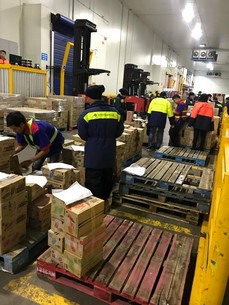 Chris also spent a few years in Thailand to develop the supply chain for the three major retailers, designing high-tech, perishable handling facilities. Teaming up again with Mathilde Thuy van Tran, he then got involved with Unilever to help fix their cold chain problems with Walls ice cream; it was not only melting, but we constructively identified that every step of their cold chain was broken and helped with an end to end intervention that allowed last mile delivery of ice cream at minus 23C in an ambient thermal protection solution uniquely developed to solve the cold chain issue. At the same time, he was working with Makro on the concept design of their new perishable centre and commuting between Bangkok and Vietnam. This was early 2020, then COVID19 happened. Having to undergo voluntary quarantine to access the Unilever office in a hotel room in Vietnam with two pairs of undies and depression - the day the quarantine ended is when the borders closed.
Chris also spent a few years in Thailand to develop the supply chain for the three major retailers, designing high-tech, perishable handling facilities. Teaming up again with Mathilde Thuy van Tran, he then got involved with Unilever to help fix their cold chain problems with Walls ice cream; it was not only melting, but we constructively identified that every step of their cold chain was broken and helped with an end to end intervention that allowed last mile delivery of ice cream at minus 23C in an ambient thermal protection solution uniquely developed to solve the cold chain issue. At the same time, he was working with Makro on the concept design of their new perishable centre and commuting between Bangkok and Vietnam. This was early 2020, then COVID19 happened. Having to undergo voluntary quarantine to access the Unilever office in a hotel room in Vietnam with two pairs of undies and depression - the day the quarantine ended is when the borders closed.
Chris ended up being ‘stuck’ in Vietnam for much longer than he’d first thought, eighteen months to be precise. Being a stranded subject matter expert had its benefits. With the Big4 consulting companies, unable to fly their regional experts into Vietnam, it resulted in Chris picking up a number of projects including a major Vietnamese sugar supply chain project with his consulting buddy Mathilde Thuy van Tran and another logistics implementation contract with a fast growing pharmaceutical company.
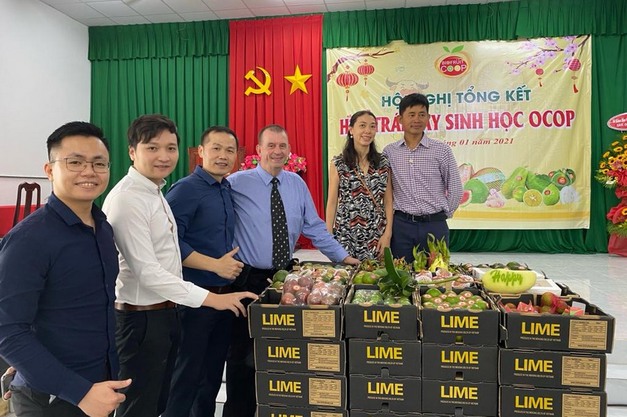
“I finally ended up with my Vietnamese consulting buddies again and winning a highly lucrative (but as it turned out, short-lived) contract from one of the major reefer companies to set up a perishable handling facility for fruit in the Mekong. Vietnam is known as the fruit basket, but one of the poorest provinces Hau Giang had almost no logistical capabilities. It was also heavily controlled by Chinese traders and most of the fruit was going by ambient truck through the congested borders into China. There was about 65% loss rate in Vietnamese fruit into the Chinese markets because no one was spending money or investing in anything that provided quality handling and quite often the borders were being closed to disrupt supply from Vietnam to crash prices. Trucks were backed up, high quality fruit was going bad in delayed trucks and on the other side of the border was being purchased to be freeze dried: it was a horrendous and heart breaking bottleneck.”
One province on the Mekong had been plagued by salt intrusion into rice paddies and a few years previously the EU grant previously mentioned had provided funding to raise the level of the quality of farming techniques and to allow citrus to be grown. Salt intrusion was a major problem which in part was addressed by re-purposing the land to other more tolerant crops.
“It's a common way of dealing with salt in the land, you raise the land and you put salt tolerant, local citrus trees into that land. They take about three or four years to grow and then the next project was to bring in high quality cultivars, like pink pomelo which you can graft onto local citrus stock. The talented local agronomists bought in high quality cultivars for seedless lime, it’s the size of a billiard ball, a mix between an orange and a lime, essentially orangey but they're perfect for cocktails. The small project team identified that there were at least 100 containers a day of uplift available if a container company or reefer company could put a packing house in the province, no one believed us. Jackfruit and durian, that's the volumes coming out of the Mekong now, but despite massive demand jackfruit and durian was dominated by Chinese cartels and cutthroat price discounting and too hard to touch. The plan was to put high-end reefers into Cantho, establish a high quality packing house world class logistics and palletised loading into reefers them there and bypass the congested road trips and sell Vietnamese jackfruit in Shanghai for $60 - $70 - $100 per fruit, because the Vietnamese jackfruit is gold, not a whitey-lemon colour, like Thai jackfruit. They're very highly sought after by the Chinese. But I needed the logistic company to work with me on that - I needed the reefer supply.
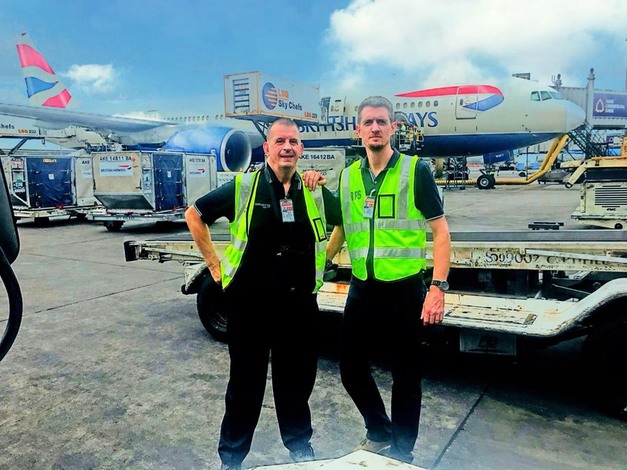
“We were in negotiations, and we confirmed the huge market potential, did the big data analysis, and we organised a town hall meeting with the 250 growers, the Provincial Governor and the People's Committee - we were going to bring the logistic God to the economy, but that logistic company got cold feet overlaid with a dash of dented ego. At the opening ceremony for the shipping company’s perishable handling centre, they did a no show. 250 farmers, the national government representatives, Cantho University Agriculture professors and our small consulting team ready for the official kick off, over 250 excited farmers turned up for the opening ceremony.
“No show and a default on the lucrative contract. I'm sitting there with my Vietnamese partner saying: What do we do? Well, we had no choice but to do it ourselves, we just went ahead and did it. I had a saying about never letting an entrepreneur own a chequebook. Well, two of us put in our total savings on the project, including selling a family farm to raise money and then we scraped together what we needed to get some trial shipments done. We were still at the start of COVID19 so hardly an ideal time for an entrepreneur to start a business involving reefers. Before you could get a reefer for $1800, by then it was $3000, then $10,000 – (we all remember that nightmare). We had 250 farmers, so the rapid solution was to form a cooperative and had it registered immediately, and under Vietnamese cooperative law you can register a cooperative, but farmers / small core of founders had no money to buy shares. So, money was lent to buy shares in the company. We started out with 250 farmers, my Vietnamese colleagues, I couldn’t be part of it only be a consultant advisor. A chairman was appointed. The team had raw energy; farmers were desperate, however they had beautiful crops that couldn't get to market. An old fish processing facility with licences was found and leased, a terrible old place, but there was one part of it that had been abandoned which was perfect for a processing and packing house, it just had to be cleaned up. If there is ever there's a self-sustaining energy then it’s from a business owner, a Vietnamese who owns part of his own business, we promised them nothing in the first six months, we would cover their costs and we would pay them at cost for their products. All we just asked from them was trust which is what we got.”
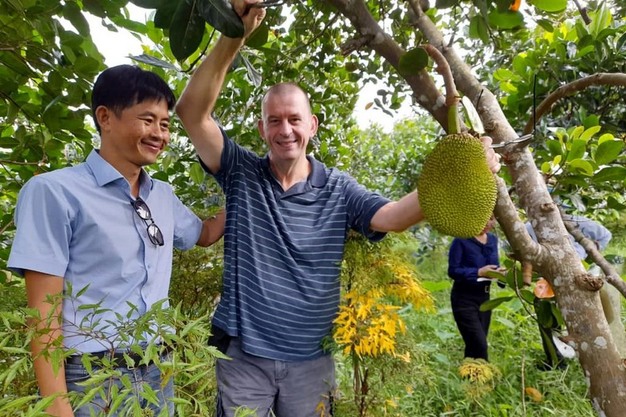
With some extraordinary networking from the Vietnamese founders, including Chris who rang a few people he knew in the UK and asked if they would take shipments, they were able to get their interest and they said they would take a look. Soon we received orders for a container into the UK and one into Canada. “We took an order from Turkey for 30% ready to drink coconut, 30% waxless lime and 30% pink pomelo Mixed order. At that time China had banned their pomelos from going into Russia, so we had a buyer desperate for our pomelos, we got an order for 10 containers.”
“But it was not all plain sailing as the container prices started to increase astronomically, due to the artificial container shortage manipulated by the shipping lines using COVID as a ruse, we were booking containers and finding prices would be increased after contracting with buyers so this resulted in cooperative losses. To test our patience we also had a shipment on the way to Turkey which got stuck behind the Ever Green obstructing the Suez Canal.
“Then to throw more stress into the start-up, Russia invaded Ukraine, and there were immediate sanctions placed on shipments to Russia, and then Putin comes online and says all shipments, any purchase is capped at $10,000. So, we assumed we had lost three shipments, and we didn't know the if the shipments were going to be turned round or be accepted, bought and dumped, with the high possibility we would be not getting paid, however we received word that we’d just received three payments in full from the company in Russia, unfortunately full sanctions interfered with that market. The Suez Canal was cleared and we received a message from the Turkish buyer saying he’d opened our container. It was pretty good. The coconuts were a little bit brown and would we accept as slight discount?
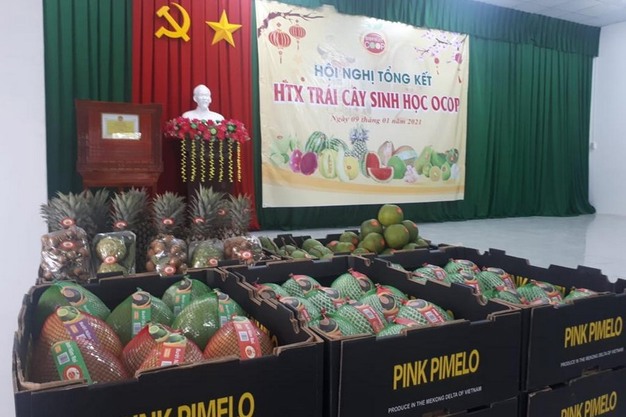
“We have now got our first shipments of fruit into Australia and New Zealand and are highly optimistic of very healthy growth projections for next year. None of this would have happened if that shipping company had not defaulted on our consulting contract. Life is like that!”
The Cooperative has now won two global awards including the prestigious Cool Logistics Global Award for Innovation and Sustainability – the future looks bright.
Chris is continuing his sustainability crusade with innovative projects in Laos on climate change adaption, and Asia Development Bank project to improve healthcare equipment maintenance and coordination of a UNICEF / GAVI funded solar vaccine fridges installation into remote healthcare facilities, In parallel his is currently undertaking logistics improvement projects in Vietnam.
For more information:
Chris Catto Smith
www.freshport.asia
